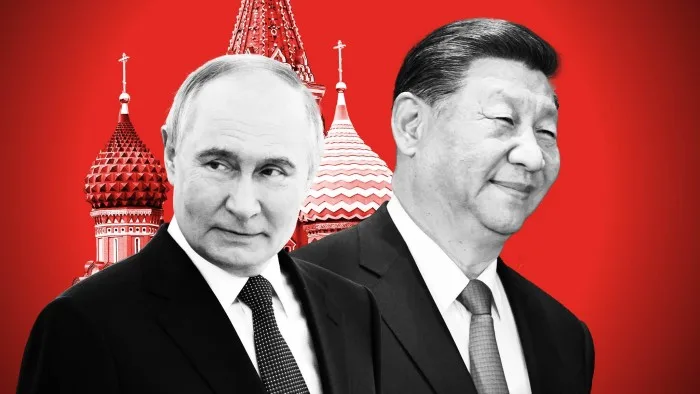Xi Jinping has drawn a parallel between modern-day US “hegemony” and the “arrogant fascist forces” of 80 years ago, ahead of Thursday’s Moscow summit with Vladimir Putin and second world war “Victory Day” celebrations.
The Chinese and Russian presidents are using the visit to signal the strength of their alliance against the US-led international order, as President Donald Trump unleashes tariffs on Beijing and tries to push Moscow towards a peace deal with Ukraine.
“The just forces of the world, including China and the Soviet Union, fought bravely and defeated the arrogant fascist forces side-by-side,” Xi wrote in an article published in Russian and Chinese media. “80 years later, unilateralism, hegemony and bullying are extremely harmful. Humanity is once again at the crossroads.”
Moscow struck a similar note in the run-up to Thursday’s summit, the first between Putin and Xi since Trump took office in January and stepped up the trade war.
The meeting will “send a powerful signal against attempts to rewrite the results of the second world war” while Europe was “preparing for war with Russia like the Third Reich once did”, said Russia’s foreign ministry, according to state newswire Tass.
The two leaders will have to overcome some challenges, as China looks to improve its relations with Europe after being hit with US tariffs — while Beijing also fears that a Trump-Putin détente could affect its partnership with Russia.
On Friday, Xi will attend a Red Square parade for the 80th anniversary of the Soviet Union’s second world war victory alongside 28 other foreign leaders including Brazil’s Luiz Inácio Lula da Silva, Serbia’s Aleksandar Vučić and Slovakia’s Robert Fico.
The preparations have been marred by three days of Ukrainian drone strikes in Russia that forced the closure of Moscow airports for several hours.
The Kremlin wants the image of Xi observing Russia’s military might to underscore how it has overcome years of western attempts to isolate Moscow over the invasion of Ukraine. Putin has justified the war through baseless comparisons of Kyiv’s government to Nazi Germany.
Beijing has not openly taken sides in the war but has helped Moscow weather sanctions, sending bilateral trade soaring from $147bn in 2021 to $245bn last year.
In recent months, however, bilateral exports have slowed to their lowest level since the start of the invasion due to falling prices for Russia’s hydrocarbons and slumping Russian demand for Chinese cars.
“The economic relationship between China and Russia is already very high, in part because of the war in Ukraine, and there may not be a lot of additional potential,” said Li Mingjiang, a professor at Nanyang Technological University in Singapore.
To grow trade with Russia significantly, China would need to consider ambitious infrastructure projects such as the long-delayed Power of Siberia-2 gas pipeline — which it has so far proven reluctant to do, said Alexander Gabuev, director of the Carnegie Russia Eurasia Center.

Russia, struggling with high inflation driven by the war, has limited capacity to absorb even greater volumes of Chinese goods, he added.
But if Trump refuses to strike a deal with China on tariffs, Beijing could “stop caring” about US sanctions on Russia, Gabuev said. “If there are 125 per cent tariffs, they can just tell the US to screw themselves and do whatever they want with Russia,” he said.
The US trade war has also pushed Beijing closer to Europe, however, potentially limiting how far Xi can deepen ties with Russia. Some Chinese scholars said the country would be keen to see Russia sign a US-brokered peace deal with Ukraine, if only to simplify its relations with Europe.
“If the war could be ended then China could finally finish this tightrope act with Russia and the west and get back to smoother relations between the great powers. The Ukraine war is always haunting China,” said Zhu Feng, dean of the School of International Studies at Nanjing University.
Nanyang Technological University’s Li said while China would not openly split with Russia, “I wouldn’t be surprised if Chinese officials quietly . . . deliver certain messages that may help reassure the Europeans that China will try to quietly play a helpful role in terms of a ceasefire deal”.
Xi did not mention Ukraine in his article. Instead, he attacked the “war criminals” of the second world war, describing China and Russia as “constructive forces in maintaining global strategic stability” and calling for the upholding of the UN Charter.
But analysts said his message would raise some eyebrows given that Putin has launched Europe’s biggest conflict since the second world war, in violation of UN rules, and been accused of war crimes himself.
“People will see the irony and the contradictions,” Li said. “That would definitely, for the rest of the international community, weaken the effectiveness of these Chinese narratives.”

